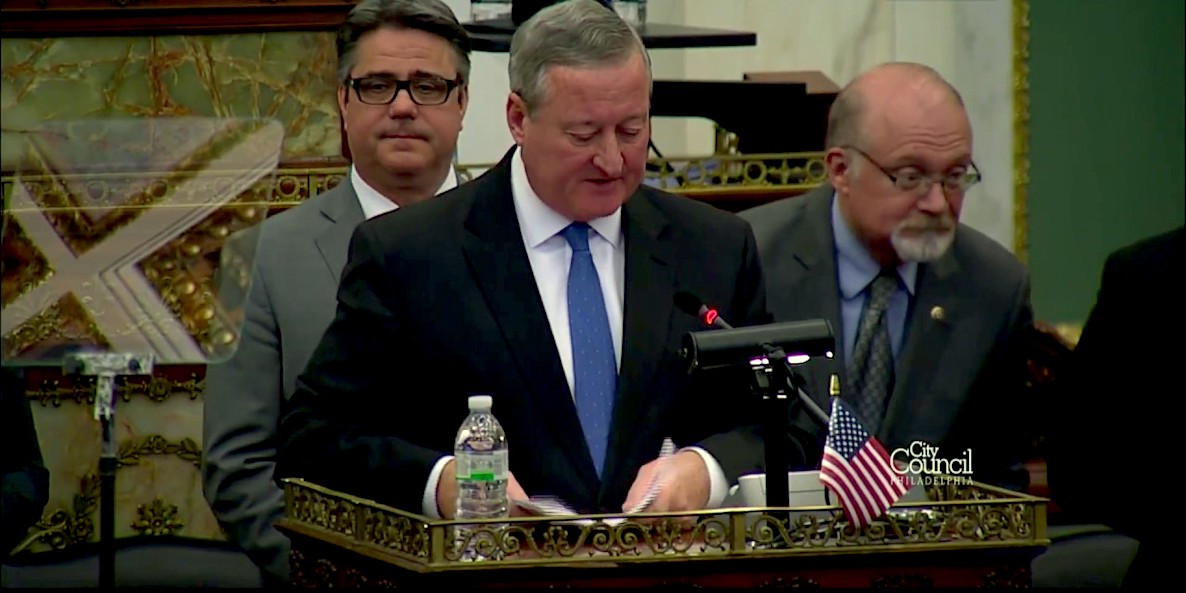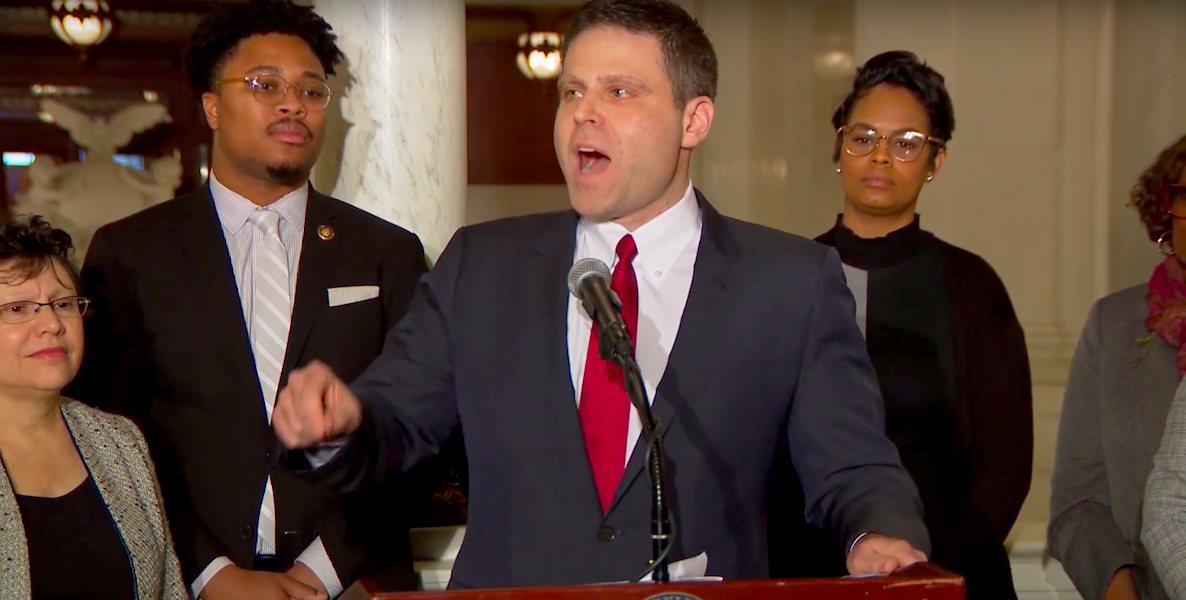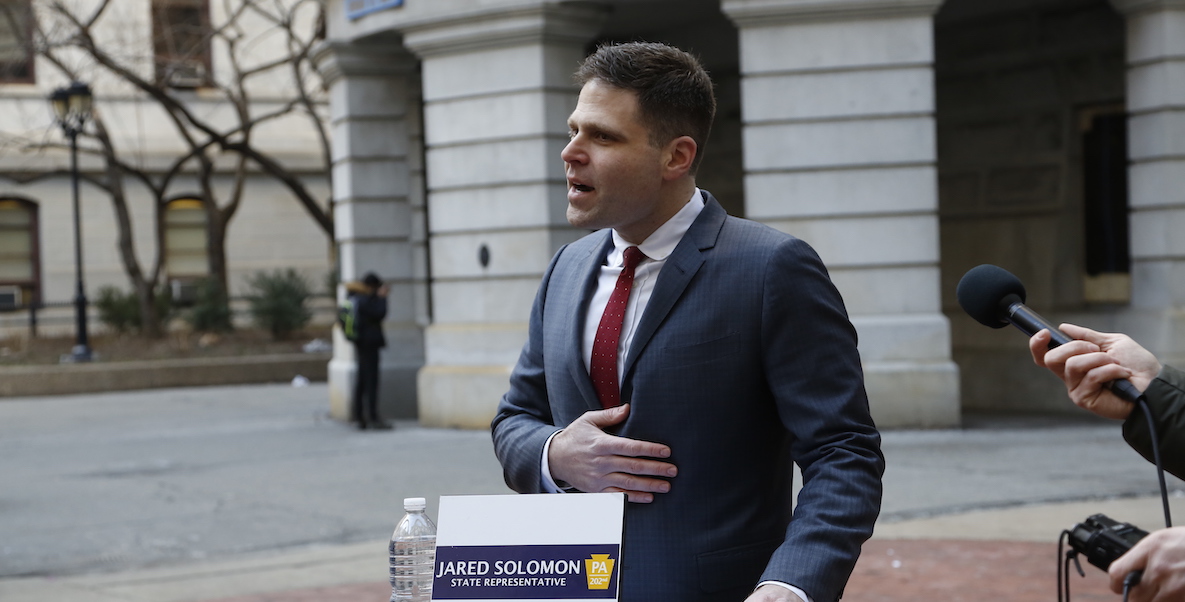This morning, State Representative Jared Solomon is holding a press conference in Harrisburg to announce a bill that would give Pennsylvania voters the right to remove elected officials from office by circulating recall petitions—a power voters have, in one form or another, in 19 states.

Prefer the audio version of this story? Listen to this article on CitizenCast below:

The impetus for Solomon’s proposal? There’s some debate about that. The insider political and media class is looking askance at Solomon, trying to figure out his angle. Because everything in Philly politics is about something else, right? Some agenda? But when I caught up with Solomon a few days ago, it seemed pretty clear what is driving him: Good old-fashioned political outrage, the same emotion that prompted the 40-year-old first term legislator from the Northeast to hold a press conference a couple of weeks ago calling for indicted City Councilman Bobby Henon to resign.
“If you read that indictment, how can you not speak out and say this is not okay?” Solomon said, referring to the federal indictment of both Henon and Local 98’s John Dougherty that lays out the myriad ways the labor leader is alleged to have weaponized the city councilman to serve his own private interests. “Yes, everyone is entitled to his day in court. But we have real challenges in the Northeast—increasing poverty, food insecurity. At every one of my town halls the number one complaint I get is just how filthy our city is. How can you not speak out when you read that indictment and see an elected official not focusing on those issues, but on serving the interests of one guy? Don’t you have to call that out?”
Which gets us to the recall idea. Solomon reels off a litany of recent cases that have left voters with no say for months on end over bad actors who have profited off the taxpayer’s dime or otherwise brought shame to their office, from Vanessa Lowery Brown to Brian Ellis to Chaka Fattah, back when the local Democratic party endorsed him for reelection after he’d been indicted. “We need to find ways to return power to the people throughout the Commonwealth,” Solomon says. “Voters no longer have the ability to say, ‘What you’ve done is egregious and you no longer represent our values.’”
Solomon’s bill would amend the state constitution to allow lawmakers to craft recall legislation. Such an amendment would have to pass two successive legislative sessions in order to be put before the voters in a statewide referendum. That’s not only a longshot, it’s also a long way away; the voters will weigh in at the polls on Henon (who, shamefully, will run unopposed in May’s primary) long before any recall action can be taken—in the unlikely event the enabling legislation even passes.
“It feels good when you’re doing the right thing,” Jared Solomon says. “I sleep well at night.”
Now, If you’re a big believer in Democracy, it’s generally hard to argue for remedies beyond the ballot box. Duquesne University Law Professor Bruce Ledewitz told WHYY.com that Solomon’s is a “terrible idea” because, in these polarized times, such provisions become political weapons. He’s right—in a perfect world. But in a corrupt, one-party town like Philly, it’s become pretty clear that business-as-usual hasn’t been cutting it.
There is no opposition party, and our string of perp walks on the nightly news only serves to fuel voter cynicism and depress turnout. Besides, Solomon argues, in order to get on a statewide ballot, an amendment petition would likely have to collect signatures totaling somewhere between one quarter and one third of the state’s voters. And that’s just to get the question on the ballot for a vote. So: a ton of signatures followed by a vote…that actually sounds pretty Democratic, no?
That said, Solomon stresses that his proposal is bigger than just this latest outrage. It’s not so much about Bobby Henon as it is about doing something to stand up to an insider culture that simply accepts the allegations against Dougherty and Henon as the price of doing business in Philadelphia.
![]()
Expect Solomon to feel some blowback from the establishment after today’s presser. That’s what happened after his earlier City Hall press conference. Here at The Citizen, we ran his remarks in their entirety under the headline “Finally!!!” because, tellingly, no other elected official had stepped up to say that, based on the indictment’s allegations, Henon ought to do the right thing and step down.
But, in both a sign of the power and breadth of the Philly Shrug and of the degree to which local insiders enable our bad actors, it was Solomon who came in for criticism. Pundits and colleagues told him he was committing political suicide by tangling with Local 98, and even local media took him to task. Rather than seeing it as news that a public officeholder had defied our town’s culture of omertà and called for one of his own to be held accountable, a more cynical and self-interested narrative took hold. By calling a press conference in front of City Hall, the conventional wisdom went, Solomon led the political and media industrial complex to believe that he’d be challenging Henon. Solomon, the reporting implied, not only had manipulated the press in order to showboat, he was a hypocrite, too, given that he’d accepted Local 98 donations in the past. It may have been unwitting, but the effect of this coverage was clear: In a classic case at the nexus of stenography and false equivalencies, the status quo was protected, rather than challenged.
A litany of recent cases have left voters with no say for months on end over bad actors who have brought shame to their office, from Vanessa Lowery Brown to Brian Ellis to Chaka Fattah, back when the local Democratic party endorsed him for reelection after he’d been indicted.
“Look, I get that the press is obsessed with the horserace,” Solomon told me. “But this obsession over who’s running, who’s raised how much, who’s up, who’s down, is bad for Democracy. The people get this. In my District, when I called for Bobby to step down, I got a ton of ‘Attaboys’ on the street. But from the Center City establishment? Silence.”
So let’s recap. Solomon calls for an indicted public official to do the right thing and step down. The political consultants tell him there’s no political edge in it for him, and other electeds maintain their Monk-like vow of silence. And media calls into question his motives. I heard the whispers from City Hall insiders and reporters alike: What’s Solomon up to? Is he an agent of mayoral wannabe Alan Butkovitz—also from the Northeast—or is he doing the bidding of the soda lobby?
Telling, isn’t it, that never in the calculations is it even considered that maybe the most obvious scenario applies? That, crazy as it is to believe in such a transactional town, sometimes there really are leaders who take a principled stand now and again.
Solomon stresses that his proposal is not so much about Bobby Henon as it is about doing something to stand up to an insider culture that simply accepts the allegations against Dougherty and Henon as the price of doing business in Philadelphia.
“I’ve got to tell you, when I first read the indictment and no one was saying anything about it,” Solomon says, “you begin to question whether you’re crazy. Am I reading this indictment correctly? What am I missing here?”
The more he stewed over it, the more Solomon realized why the code of silence was so deafening. “I kept asking myself, ‘Why are there not 50 electeds jumping up and down and screaming about this scandal?’” he said. “And we know why. We’ve known for a long time that the key to winning elections is money and manpower, and that Local 98 delivers both in a real way. That’s why, when I ran against the longest-serving state rep in the legislature, everyone said you should have a relationship with Doc. And I did. And I took his money. A lot of us had heard about his tough tactics, but we looked the other way. He could provide money and manpower, and he did good in the city, too. So we could look away. But after I read the indictment, I couldn’t look the other way anymore, because there’s a human cost to corruption. There’s all these great things happening in Philadelphia—our sports teams are even winning—but we’ll never take that last step toward being great if we don’t clean all this up and restore trust to our politics.”
![]()
Solomon knows he is in for a fight, now. This, sadly, is what a profile in courage looks like in modern-day Philadelphia, someone who has the temerity to call for an indicted politician to step down and who proposes Democratic fixes for a broken Democracy. The key question will be: Will Solomon’s constituents have his back? Few local pols hold more town halls and fewer still focus so intently on constituent service. Solomon knows his audience, and he knows what they want. They tell him at his town halls: Cleaner and safer streets, fewer potholes.
But politics used to be about more than just a quality of life improvement here, a corner drug bust there. It also used to be about persuading constituents to care about something big. Something like Democracy itself. Solomon knows his District because it’s where he was born and bred, it’s in his bones, and he’s banking on his voters sharing his values, and seeing, as he does, that corruption really does adversely affect their lives, draining resources and talent that would otherwise be invested in solving their problems.
Local 98 has (ludicrously) demanded that Solomon return to the union its past donations, and has even preposterously threatened to sue the lawmaker. (“I’m not sure what they’re going to sue me for,” Solomon told the Inquirer. “Not being their puppet?”) All of which, of course, gives rise to a couple of thoughts.
First, what does Local 98’s reaction to Solomon’s criticism of Henon say about why the union’s leadership donates in the first place? Seems like they believe they were paying for a certain, non-critical point of view from him, doesn’t it?
Second, it’s pretty clear that Local 98 will be gunning for Solomon in this year’s election. Union mouthpiece Frank Keel has said as much. But Solomon draws a critical distinction, between what he sees as corrupt union leadership and its rank and file. “If, as Democrats, we really value hard working people and the dignity of their work, how can we be okay with their hard-earned dues going to support and enrich one individual?” he asks.
Unlike Johnny Doc, Jared Solomon speaks slowly. He’s methodical, not given to red-faced rants and the vocabulary of political score-settling. But it may be that he’s tougher than he seems. It’s a toughness born not of bombast but the moral high ground. Talking to him, he sounds eager for a fight…and at peace, something you can’t help but wish for so many other local pols whose fingers are so busy testing the political winds. “It feels good when you’re doing the right thing,” Jared Solomon says. “I sleep well at night.”
Photo via PA House







